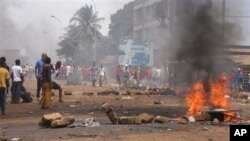CONAKRY —
Three days of ethnic violence in Guinea last week left 98 people dead, nearly double the previous death toll, the government said on Wednesday.
The violence erupted on July 14 after a man accused of being a thief was lynched. It took place during tense preparations for long-delayed elections meant to restore civilian rule after a 2008 military coup.
"We are today at around 100 dead — 76 victims in [Guinea's second largest city] Nzerekore and 22 others in Koule," government spokesman Damantang Albert Camara said.
The government said on July 18 that 58 people had died in the clashes in the southeast of the country between the mainly Christian or animist Guerze community, which is dominant in the region, and the northern Konianke, who are mainly Muslim and have settled there.
At least 160 more were injured, it said at the time.
The fighting began shortly after rival political parties agreed to hold legislative elections on Sept. 24 after months of deadlock and street protests which often degenerated into ethnic clashes.
The government deployed troops to the region to quell the violence, and at least 131 people suspected of having taken part in the killings have been arrested, Camara said.
"We're now doing a triage to find out who did what," he said. "Some were arrested with machetes or clubs but others had [hunting rifles] and military weapons."
The violence erupted on July 14 after a man accused of being a thief was lynched. It took place during tense preparations for long-delayed elections meant to restore civilian rule after a 2008 military coup.
"We are today at around 100 dead — 76 victims in [Guinea's second largest city] Nzerekore and 22 others in Koule," government spokesman Damantang Albert Camara said.
The government said on July 18 that 58 people had died in the clashes in the southeast of the country between the mainly Christian or animist Guerze community, which is dominant in the region, and the northern Konianke, who are mainly Muslim and have settled there.
At least 160 more were injured, it said at the time.
The fighting began shortly after rival political parties agreed to hold legislative elections on Sept. 24 after months of deadlock and street protests which often degenerated into ethnic clashes.
The government deployed troops to the region to quell the violence, and at least 131 people suspected of having taken part in the killings have been arrested, Camara said.
"We're now doing a triage to find out who did what," he said. "Some were arrested with machetes or clubs but others had [hunting rifles] and military weapons."





